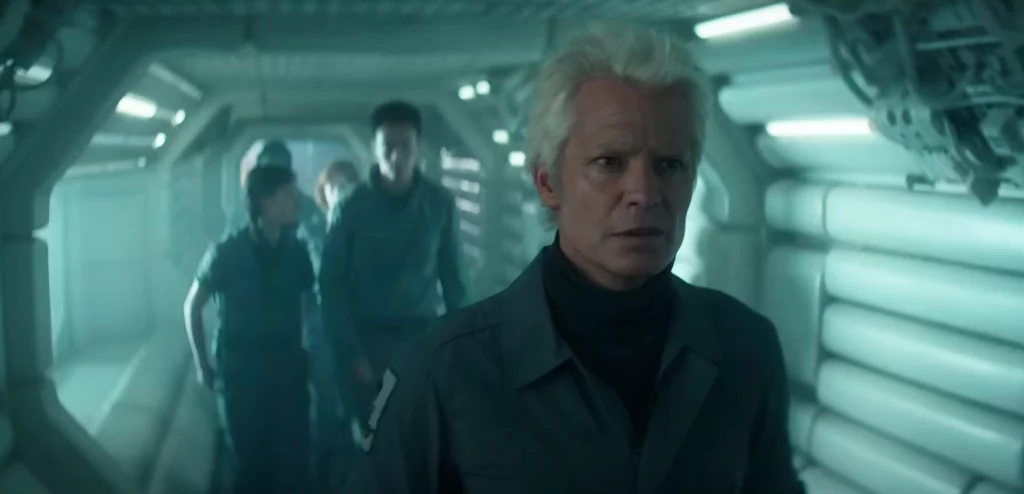After decades of films, spin-offs, and prequels, Alien: Earth marks the first official TV series set in the Alien universe. Expectations run high, especially for a franchise known for claustrophobic horror and one of the most iconic movie monsters ever. With Noah Hawley (Fargo, Legion) at the helm, we hope for a deep, visually striking take. That hope is partially justified: Alien: Earth introduces fresh ideas wrapped in stylish visuals.
The series opens on a promising note with a scene aboard the Maginot, a spaceship whose atmosphere closely echoes Ridley Scott’s 1979 Alien. The futuristic look and eerie silence feel instantly familiar. But that recognizable tone fades quickly as the focus shifts away from space horror to a setting that resembles a technological dystopia: Earth itself, controlled by megacorporations like the familiar Weyland-Yutani and the new Prodigy.

At the center is Wendy (a compelling performance by Sydney Chandler), a hybrid artificial human carrying the consciousness of a terminally ill child. This is not your typical coming-of-age story, instead, it follows an artificially grown woman with a child’s mind, trying to navigate a world that sees her as an experiment. These experiments unfold on Paradise Island, also known as “Neverland,” where hybrid children in adult bodies are observed, raised, and controlled.
It’s an intriguing premise: children trapped in bodies that never age, without hormones or emotions, but still carrying memories and trauma from a previous life. Kirsh, a senior synth played by Timothy Olyphant, acts as their mentor and delivers one of the series’ strongest performances. His calm, almost mechanical observations quietly raise fundamental questions: why would emotions be necessary in an artificial body?

Though Alien: Earth tells a complex and original story, it struggles at times with pacing and balance. The tense xenomorph scenes — including new, terrifying alien lifeforms — are there, but often interrupted by lengthy, sometimes sluggish dialogue. The kills are brutal, the visual effects impressive, yet the narrative occasionally falters.
The visual style on Earth also loses some of the franchise’s signature magic. The look is slicker, more generic, which diminishes the series’ identity despite its unique angles.

Moreover, it’s hard to believe that a hyper-technological Earth couldn’t detect an approaching alien ship, let alone allow it to crash in a crucial location unnoticed. These logical gaps remain unexplained and apparently unimportant to the creators. The focus lies more on themes than on world-building logic.
Alien: Earth contains enough gore and menace to earn its Alien label. Each episode delivers horror, often brutal and bloody.
The two leads carry the show. Sydney Chandler convincingly portrays Wendy’s innocence, confusion, and resilience. Timothy Olyphant as Kirsh, the synth, is undeniably the series’ highlight. The rest of the cast is uneven. Samuel Blenkin plays Boy Kavalier, the world’s youngest billionaire and creator of the hybrids. He acts like a Musk- or Zuckerberg-type: brilliant but socially difficult. While fitting for the character, his performance lacks depth. Supporting roles are mostly functional, rarely standing out.

Alien: Earth contains enough gore and menace to earn its Alien label. Each episode delivers horror, often brutal and bloody. But the real terror comes from other places: the control exerted by giant corporations over human life and the cold logic of artificial intelligence.
The series is an intriguing addition to the franchise but doesn’t fully feel at home within the Alien universe’s established boundaries. Noah Hawley delivers a layered, sometimes brilliant show that experiments with form and content. Alien: Earth asks questions about identity, power, technology, and humanity, all with visual flair and an original concept.
However, those primarily here for xenomorphs, claustrophobic tension, and familiar lore might find themselves alienated. The series does many things well but also stumbles. It feels like Alien: Earth has yet to fully become what it aims to be. It’s important to note that for this review, only six of the eight episodes were available for viewing. What unfolds in the series’ final stretch remains a mystery to us as well.

Alien: Earth premieres tomorrow, August 12, on FX in the US, and launches on Disney+ in the UK on August 13 with the first two episodes, followed by weekly releases.
This article has been written in partnership with The Nerd Shepherd.
FOLLOW US ON SOCIAL MEDIA
You may also like
-
‘Bugonia’ Trailer: Emma Stone as a CEO Suspected of Being an Alien
-
‘Fallout’ Season 2 Trailer Takes Walton Goggins and Ella Purnell to New Vegas
-
War Erupts as ‘Invasion’ Season 3 Begins on Apple TV+
-
‘Fallout’ Season 2 Sets December Return and First Look at New Vegas
-
‘Together’ Review: A Queasy, Clever Twist on Love and Body Horror

